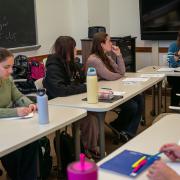What is poetry? Is it stanzas written on a page? The flow of words in a certain rhythm? And why have humans done it for thousands of years?
These questions are at the heart of a—relatively new—humanities Core course at the University of Chicago. For the past two quarters, nearly 200 first-year students in “Poetry and the Human” have discussed, pondered and recited in an exhibition at the Smart Museum of Art designed to bring these questions to life.
During class visits to Poetry is Everything, students could truly find poetry, well, in everything. In paintings, sculptures and wrapped around the outside of sake cups.
“Poetry became something much bigger than it was when I first started,” said first-year student Mariska Kassi, who has been enrolled in the course since the fall.
The exhibition marked the third iteration of the museum’s Smart to the Core series, where museum staff partner with faculty and students to design exhibitions based on UChicago’s Core curriculum. This collaboration creates galleries specifically for teaching, but also offer the general public access to a UChicago classroom.
“Looking at a text on a table, or a desk, is very different from walking among objects, or reading aloud from a text in a gallery,” said Patrick Morrissey, an instructor of “Poetry and the Human.” “Changing the physical relationship actually has an effect on the kind of thinking we can do.”
“Poetry and the Human”
Every UChicago undergraduate must complete the Core curriculum. These classes, spread across seven academic disciplines, include a sequence of two or three courses in the humanities.
The “Poetry and the Human” sequence is a relatively new kid on the block. Around 2017, Prof. Sarah Nooter was attempting to revamp an existing course, when she asked herself: What would speak to my 18-year-old self?
Her musings led to conversations with other faculty across the humanities interested in poetry. As they talked and planned, a new sequence was born.
The four courses that form “Poetry and the Human” sweep across time and space, combining texts traditionally considered classics with a much wider range of poems and poets. Students do close readings of Homer, the Popol Vuh, Gwendolyn Brooks and M. NourbeSe Philip, among many others.
“It was really a labor of love—and it still is,” Nooter said.
When the opportunity to partner with the Smart Museum arose, Nooter was thrilled.
The exhibition came together through many conversations between Nooter, the other instructors and Smart Museum curator Berit Ness. Former students of the course, Courtney McDermott, AB’25, and Layla Khazeni, AB’23, also served as curatorial interns.
“The syllabus is what made ‘Poetry and the Human’ truly extraordinary,” Khazeni said. “And we followed these course breakdowns as a foundational thematic guidebook in the development of the exhibition.”
Poetry is Everything contained art from many cultures and time periods. There were paintings and prints, but also sculptures and film—even a station for visitors to write their own poetry.
“Classes often think about stanzas and indents—the formal construction of poetry,” Ness said. “But here, we kind of expand that close-reading approach to also think about the actual physical material of poetry.”
“I appreciated how the exhibition was able to make things larger. It wasn't just words on a page, it wasn’t just us talking in a circle in class,” Kassi said. “Poetry isn’t just writing down words, it's an art and it gives way to other art forms.”
What is poetry to you?
In late January, Morrissey brought his class to the exhibition to discuss Cecilia Vicuña, a Chilean poet and multimedia artist.
As Morrissey gave an introduction to the artist’s life, a screen in the gallery silently played Vicuña’s first film, “What is Poetry to you?” (1980). The documentary follows the artist around the streets of Bogota, Colombia as she interviews everyone from children to street performers to sex workers.
Vicuña asks each person the same question: ¿Qué es para Usted la poesía?/What is poetry to you?
The students broke into small groups to further discuss the film, in addition to two poems and Chanccani Quipu (2012), Vicuña’s version of a quipu, the pre-Columbian writing system that uses knotted cords. The students also mulled over a key assignment—their take on “What is poetry to you?”
“What might you borrow from Cecilia Vicuña?” Morrissey prompted.
Phoebe Han, a first-year student planning to double major in economics and psychology, wanted to emulate Vicuña’s technique of interviewing strangers. She ventured out into the city, stopping passersby in Chinatown and Greektown.
Kassi, who plans to major in computer science, took a different approach. When watching the film, she wished Vicuña had sat longer with each person and asked more follow-up questions. She sought out creative people she knew: her R.A. and a close friend. Those in-depth conversations connected her to others.
Both students got a range of responses, though noted that many people brought up rhythm and music. Kassi chatted at length with one interviewee about the musician Mitski—a conversation that prompted her to think about the artist in a new way.
“We don't often have the time to think about our experiences and really ruminate on them for our own benefit,” she said. “But with poets and musical artists, especially Mitski, they force us to sit down and think about these connections that we might not fully realize.”
Both Han and Kassi took “Poetry and the Human” because of experiences with poetry in high school, but felt like the course shifted their understanding of both the practice and interpretation of the art form.
“I developed more skills in terms of close reading, but hearing my classmates' perspectives on poetry, and seeing just how different interpretations of the same text can be, was what I got most from the class,” Han said.
“It wasn't until I took this course that I understood that, yes, there can be different interpretations of a poem,” Kassi said. “That's the point!”

